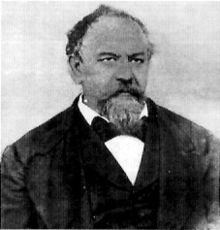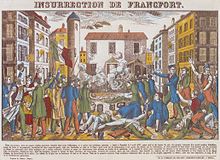Karl Schapper (worker leader)
Karl Hermann Christian Friedrich Schapper (born December 30, 1812 in Weinbach , † April 28, 1870 in London ) was one of the most important German labor leaders of the Vormärz .
Life
Schapper was born on December 30, 1812, the son of pastor Carl Conrad Christian Schapper (1779-1845) and housewife Charlotte (née Cesar) in Weinbach (1780-1814). After the completion of the elementary school he attended from 1828 to 1831 "Duke of Nassau Landesgymnasium" in Weilburg to begin after the forestry study in Giessen, he because of his membership in Giessen fraternity , he was in 1831 a member of the old fraternity Germania casting as well as the participation in the Frankfurt Wachensturm and the subsequent, only briefly interrupted escape into exile. Schapper died on April 28, 1870 of complications from pulmonary tuberculosis. His brother was August Friedrich Theodor Schapper (1814–1814). His stepmother was Johanna Charlotte Philippine Ebhardt (d. 1853). His half-brothers were Ferdinand Friedrich Karl Schapper (1816–1897) and Georg Friedrich Karl August Schapper (born 1818).
Political activity
Karl Schapper was politically active at an early age and joined the Giessen fraternity immediately after starting his studies . This stood out through demands for national unity and a comprehensive democratization of Germany and was involved in the Frankfurt Wachensturm with Schapper's participation . Like many of his fellow campaigners, Schapper was imprisoned after this attack on the Frankfurt Bundestag . With the help of individual prison guards, he first managed to escape from the prison after three months of imprisonment and in January 1834 he went to exile in Switzerland, where he was imprisoned again for six months for his involvement in Giuseppe Mazzini's armed attack on Savoy . After his release, Schapper worked as a forester in the Bern area and was involved in Junge Deutschland , a German workers' association. Because of this political influence, Schapper was initially expelled from the canton of Bern and finally from all of Switzerland in 1836. The pre-March politician Georg Fein belonged to Schapper's circle of friends in exile .
In the same year of his expulsion from Switzerland, Schapper joined the French Junge Deutschland and the Bund der Gerechtigkeit in Paris and quickly made a name for himself as an intellectual thought leader. His increasingly radical demands led to his being expelled from France after brief imprisonment in 1840 and relocated to London. In the same year he founded the English section of the Confederation of Justice , along with other associations, which quickly took over the leadership of the entire Confederation with members such as Wilhelm Weitling , Karl Marx and Friedrich Engels . In addition, Schapper became chairman of the Communist Correspondence Committee and in 1848 organized the correction and printing of the Communist Manifesto .
Like most of his colleagues, Karl Schapper returned to Germany when the revolutionary unrest began in 1848. Here he (deputy) together with Joseph Maximilian Moll (chair) initially took over the management of the Cologne workers' association and became a member of the Cologne vigilante group . As a result of the September riots , he was briefly imprisoned in 1848, but then released again. As a reaction to this, Schapper left Cologne and became involved in the Nassau democratic movement before he was imprisoned in Wiesbaden for eight months only a few months later because of his massive criticism of the constitution drawn up by the Frankfurt National Assembly , acquitted in a high treason trial and later expelled from Germany (see Idstein Democratic Congress ).
Schapper was massively disappointed by the failure of the revolution and withdrew to London. Here he hired himself almost penniless as a language teacher and fell out with Karl Marx because of different views. At his own request, he became a British citizen in July 1862. After a reconciliation in 1856, Schapper worked in the London Workers 'Education Association and was elected to the General Council of the International Workers' Association on April 25, 1865 at the suggestion of Karl Marx .
literature
- Trial of the indictment against the corrector and language teacher Carl Schapper…. Ritter, Wiesbaden 1850 digitized
- S. Lewiowa: Karl Schapper. In: Marx and Engels and the first proletarian revolutionaries . Dietz Verlag, Berlin 1965, pp. 76–119.
- Gerhard Becker: Karl Schapper. In: Men of the Revolution of 1848. ed. from the Working Group Prehistory and History of the Revolution of 1848/49, Berlin 1970, ISBN 3-920303-46-6 , pp. 123-148.
- Karl Bittel : Schapper, Karl Christian Friedrich . In: History of the German labor movement. Biographical Lexicon . Dietz Verlag, Berlin 1970, pp. 391-392
- Armin Matthäus Kuhnigk: Nassaus Tribune of the German Labor Movement - Karl Schapper from Weinbach - 1812-1870. ed. from the community council of Weinbach, 1980, pp. 123–147.
- Armin M. Kuhnigk: Karl Schapper * 1812 Weinbach (Oberlahnkreis) † 1870 London. A father of the European labor movement. Camberger Verlag Ulrich Lange, Limburg 1980, ISBN 3-87460-032-7 .
- Helge Dvorak: Biographical Lexicon of the German Burschenschaft. Volume I: Politicians. Sub-Volume 5: R – S. Winter, Heidelberg 2002, ISBN 3-8253-1256-9 , pp. 198-201.
- Barbara Gant: Schapper, Karl Hermann Christian Friedrich. In: New German Biography (NDB). Volume 22, Duncker & Humblot, Berlin 2005, ISBN 3-428-11203-2 , p. 564 f. ( Digitized version ).
- Waltraud Seidel-Höppner: Under a false name. The covenant of justice and its name change. In: Yearbook for Research on the History of the Labor Movement, Issue I / 2013, NDZ Verlag, Berlin 2013, pp. 47–57.
Web links
- Christian Baertschi: Karl Schapper. In: Historical Lexicon of Switzerland .
Individual evidence
- ^ A b Axel Kuhn: The German workers' movement. 2004
- ↑ Armin M. Kuhnigk, p. 15.
- ^ Helge Dvorak: Biographical Lexicon of the German Burschenschaft. Volume I: Politicians. Sub-Volume 5: R – S. Winter, Heidelberg 2002, ISBN 3-8253-1256-9 , p. 198.
- ↑ Armin Matthäus Kuhnigk: Nassaus Tribune of the German Workers' Movement - Karl Schapper from Weinbach - 1812-1870 , p. 15.
- ↑ Cf. Dieter Lent: Finding aid on the inventory of the estate of the democrat Georg Fein (1803 - 1869) and the Fein family (1737-) approx. 1772-1924. Lower Saxony archive administration, Wolfenbüttel 1991, ISBN 3-927495-02-6 , pp. 82, 356.
- ^ New German Biography. Volume 22, Berlin 2005.
- ^ The National Archives. HO 1/106/3873. Naturalization Papers: Schapper, Karl, from Nassau. Certificate 3873 issued 12 July 1862.
- ^ Meeting of the Central Council. April 25, 1865 . In: Documents of the First International. 1864-1866 . Lawrence & Wishart, London n.d., p. 91
| personal data | |
|---|---|
| SURNAME | Schapper, Karl |
| ALTERNATIVE NAMES | Schapper, Karl Hermann Christian Friedrich (full name); Schapper, Carl; Schill, Carl (federal name) |
| BRIEF DESCRIPTION | German workers leader |
| DATE OF BIRTH | December 30, 1812 |
| PLACE OF BIRTH | Weinbach |
| DATE OF DEATH | April 28, 1870 |
| Place of death | London |

